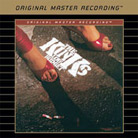September 2003
The first time I listened to the Kinks I heard elements of the Rolling Stones and the Who. I also heard vocals reminiscent of Dire Straits and even Sting. But since Dire Straits and the Police started out in the late ‘70s, the root of influence is apparent. For example, there is more than a passing resemblance between the Kinks' "(Wish I Could Fly Like) Superman" and Dire Straits’ "Money for Nothing." The Kinks started out life in 1963 as the Ravens but quickly changed their name in ‘64 after a couple of Ravens singles tanked. The breakthrough single "You Really Got Me" is a good example of the band’s early, frenetic sound. It seemed that the Kinks were on their way to a successful future until unacceptable behavior during a tour banned them from the United States. The band remained relatively obscure here until the chart topping "Lola" from Lola Vs Powerman and the Moneygoround, Part One offered them a second chance at fame in the US in 1970. The band signed a contract with a new label, RCA, in 1971, but their records -- including such gems as Muswell Hillbillies, Preservation Act 1, and Preservation Act 2 -- didn’t sell. It wasn’t until they signed with Arista Records in 1977 and released Sleepwalker that they began making hit records again. Arista released Low Budget, the band’s third LP for them, in 1979. Low Budget is a fantastic recording, and Mobile Fidelity seems to have successfully captured all the energy and detail that was originally recorded by John Rollo. What impressed me most was how alive this recording sounded -- and I don’t mean alive in the sense of edgy or bright. The remastering is incredibly refined and smooth-sounding, but it also delivers some of the most impressive snap and "air" I have heard from the digital medium. The crackling sound of percussion had me on the edge of my seat, while the abundant guitar work emerged from a soundstage of perfect placement and larger than life dynamics. The level of clarity in the disc drove me to play it at very loud levels. I also had the HDCD version of Low Budget on hand. Comparing the two was like comparing a canned recording to a live event. The HDCD sounded crisp and dynamic. The HDCD also exhibited a soundstage of considerable width and depth. On its own the HDCD sounded very good. But once I spun up the SACD there was no going back. The HDCD sounded compressed and congested compared to the open and far-reaching dynamic range of the SACD recording. The SACD had a sound that pulled me into the music, while the HDCD just played. It may be a worn out analogy, but the HDCD was black and white, while the SACD was Technicolor. This Mobile Fidelity recording is a very impressive piece of work, although I should mention that the Hybrid CD portion of the SACD was not as good as the HDCD version. It makes complete sense that the Kinks' 1979 Low Budget would make it on to two-channel SACD. Having charted higher in the United States than any other Kinks effort, Low Budget is evidence that the Kinks did have a loyal fan-base in the states. And while they may not have equaled the popularity of the Rolling Stones or the Who, their songwriting ability, musical ambition, and talent were certainly in the same league. GO BACK TO: |
 The Kinks - Low Budget
The Kinks - Low Budget It becomes increasingly difficult from this distance to figure out which band
influenced other bands during the ‘60s. As a case in point, take the Kinks. Did the
Who and the Stones influence them, or did the Kinks influence the Rolling Stones and the
Who? Those who grew up in the ‘60s may know the answer to this question, but for a
relatively young pup like myself, marketing promotions tend to form reality. Ask someone
on the street and chances are they would recognize the Stones and the Who, but you might
be met with a perplexed look regarding the Kinks.
It becomes increasingly difficult from this distance to figure out which band
influenced other bands during the ‘60s. As a case in point, take the Kinks. Did the
Who and the Stones influence them, or did the Kinks influence the Rolling Stones and the
Who? Those who grew up in the ‘60s may know the answer to this question, but for a
relatively young pup like myself, marketing promotions tend to form reality. Ask someone
on the street and chances are they would recognize the Stones and the Who, but you might
be met with a perplexed look regarding the Kinks.